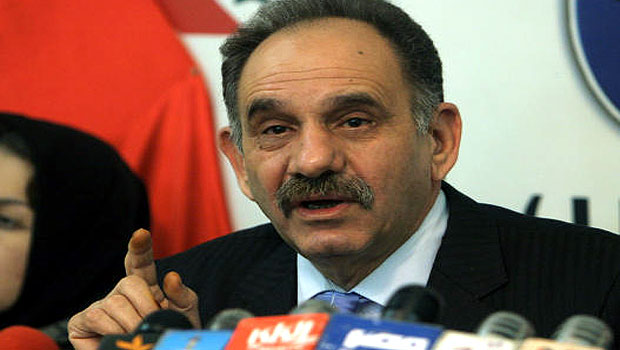
In this Jan. 9, 2006 file photo, Iraq’s Deputy Prime Minister Saleh al-Mutlaq, speaks to reporters in Baghdad, Iraq. (AP)
Mutlaq, who is head of the Iraqi Front for National Dialogue—which itself is part of the opposition Iraqiya bloc— attended a controversial cabinet session in Baghdad on Tuesday to discuss the protesters demands. This comes amidst media speculations that the Iraqi deputy prime minister had struck a deal with Maliki, under the auspices of allies Lebanon’s Hezbollah, to return to the cabinet and support the prime minister. The Iraqiya bloc, the Sadrists, and others, have frozen their membership in the Baghdad government in solidarity with the widespread popular protests that have erupted across Iraq.
A source close to Mutlaq, speaking to Asharq Al-Awsat on the condition of anonymity, denied these media claims, emphasizing that they are “unworthy of response.”
The source added: “We have become used to some news website publishing fabricated and commissioned news with political aims. The appearance of such fabricated news becomes more frequent, the closer we get to the elections.”
He asked: “Why would Mutlaq strike a deal with Hezbollah to unite with Maliki when he is his deputy and there has been no break between the two sides?”
The source emphasized: “Dr. Mutlaq is committed to meeting the demands of the people.”
He also stressed that Mutlaq’s attendance of the cabinet session “came in the context of the cabinet’s announcement of the special session to discuss the demonstrators’ demands.”
He added: “This also coincided with the demonstrator’s announcement of the formation of a negotiating delegation; therefore we have entered a new phase that requires that we move from promises to practical applications.”
The source also denied the reports that Iraqiya bloc spokesman, Haider Al-Mulla, had been fired. He confirmed that “This news is also part of the campaign of lies and disinformation and Mulla himself issued a statement supporting Mutlaq and the Iraqiya bloc ministers who attended the cabinet session.”
In this statement, Mulla has stressed that the Iraqi cabinet’s discussion of the protester’s demands represents a step in the right direction.
He said: “We have always said that the priority in the current phase must be the people, not the government, and that is why we backed and supported the demonstrations that put forward legitimate national demands seeking to lift the injustice that has beset the people of Iraq, most prominently regarding the issue of Iraqi female prisoners, as well as regarding education. They have raised these issues repeatedly, calling for the government to respond quickly to their demands and for the cabinet to hold a special session to put in place a timetable to meet the protesters demands.”
Iraqiya bloc MP Hamid al-Zubaie informed Asharq Al-Awsat that Mutlaq—along with some other Iraqiya bloc ministers—took the decision to break the government boycott and attend the cabinet session “in the hopes of achieving something tangible.”
However Zubaie also stressed that this decision by a handful of Iraqiya bloc ministers does not represent a change in the coalition’s official position towards the cabinet boycott. He stressed that while the Iraqiya bloc hopes that this special cabinet session will have a successful outcome, the political crisis in Iraq remains unresolved.
He emphasized that “the crisis of trust remains in place because of his [Maliki’s] failure to implement pledges and agreements, ever since the Erbil agreement.”
He added: “Mutlaq has continued to take action, and this does not represent a departure from the Iraqiya bloc, however at the same time this does not represent an agreement [with Maliki].”
